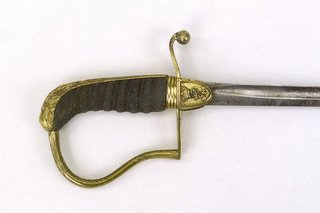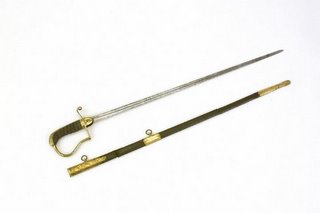Admiral Alfred Luckraft's Sword

The National Maritime Museum carries this entry from its collection; url at the end of the article.
Stirrup hilted dress sword, which belonged to Admiral Alfred Luckraft (circa 1792-1871).
The hilt of the sword consists of a gilt stirrup guard; the langets are embossed with a crown and anchor motif. The sword has a lion's-head pommel and back-piece, the mane extending halfway down the back-piece. The sword has a blue and gold sword knot with a round tassel with a gold fringe and eighteen gold bullions. An anchor and cable motif is embroidered on each side and executed on a blue ground inside a small oval shield with a cable edge. This was the regulation sword knot for commissioned officers between 1805-1827.
The black fish-skin grip is bound with three gilt wires. The flat-back, straight steel blade has a single broad fuller running nearly to the point, which is double-edged 13mm from the end. Both sides of the blade are engraved with floral decoration and naval emblems, but the blade is not damascened. The black leather scabbard has two gilt lockets, with rings, and a chape. All are heavily chased with floral designs and leaves.
Admiral Alfred Luckraft's name was put down for service aboard HMS 'Monarch' in 1799 and he was present at the Battle of Copenhagen. As a midshipman aboard HMS 'Mars' at the Battle of Trafalgar he was wounded in the leg. As a Lieutenant he served in HMS 'Blonde' at the reduction of Morea Castle in 1828. He is mentioned in dispatches, and was created a Knight of the Legion of Honour and awarded the Order of the Redeemer of Greece. His flag rank appointments were all granted on the retired list. He also received a gratuity from Lloyds Patriotic Fund as a consequence of his wounding at Trafalgar. He died on the 11th December 1871.

http://www.nmm.ac.uk/collections/displayRepro.cfm?reproID=E1081&picture=2#content

0 Comments:
Post a Comment
<< Home